ETH Day 2020
ETH Zurich celebrated its 165th year at this year’s ETH Day (its academic holiday) on 21 November 2020 under extraordinary circumstances.
Programme of the academic ceremony
Claudio Monteverdi, L’Orfeo, excerpt from the overture
* * *
Professor Sarah M. Springman, Rector of ETH Zurich
Opening remarks
* * *
Presentation by students
helpfulETH and Students4Hospitals projects
* * *
Professor Joël Mesot, President of ETH Zurich
Review of the past year and outlook
* * *
Remembering those we have lost
Sir Edward Elgar, from the Enigma Variations, 9th variation (“Nimrod”)
* * *
Honours
- Awarding of industry and foundation prizes
- Awarding of the Golden Owl and the Credit Suisse Award for Best Teaching by the ETH Zurich Association of Students (VSETH) with a speech by the VSETH president Luca Dahle
- Awarding of honorary doctorate and appointment of honorary councillors
* * *
Professor Sarah M. Springman, Rector of ETH Zurich
Closing words
* * *
Felix Mendelssohn Bartholdy, String Quartet No. 2 in A minor, Op. 13, excerpt from the 4th movement
Played by the string quartet of the Academic Orchestra Zurich with Ferdinand Nussbaum (1st violin), Sarah Ihn (2nd violin), Chantal Moser (viola) and Emanuel Hubmann (cello).

Professor Sarah M. Springman (Rector of ETH Zurich)
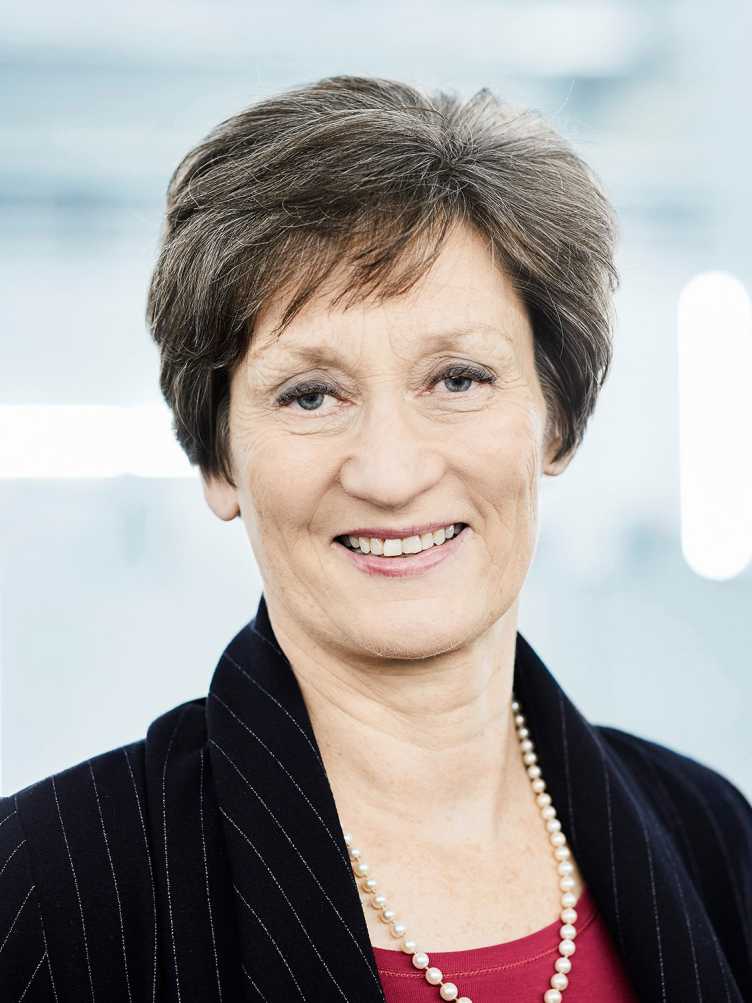
Sarah Marcella Springman has been Full Professor of Geotechnical Engineering since January 1997 and Rector of ETH Zurich since January 2015. In this role, she is responsible for all teaching matters and for the organisation and quality assurance of study programmes. She confers the Venia Legendi and awards teaching assignments, invites guest lecturers and approves further education courses. She is also responsible for scholarships, cooperation with secondary schools and student exchanges. Before joining ETH, Professor Springman researched and taught in the UK, as well as working in the UK, Fiji and Australia as an engineer. Her research interests focus on soil-structure interaction and the geotechnical aspects of natural hazards.
Professor Joël Mesot (President of ETH Zurich)

Joël Mesot has been Full Professor of Physics since 2008 and President of ETH Zurich since 2019. He studied at ETH himself, and received a doctorate in solid state physics. As president, he bears overall legal and political responsibility for the university. He is in charge of the process for appointing new professors, and defines strategy together with the Executive Board and other ETH committees. He is also responsible for maintaining relationships with the authorities, policymakers and the public. He was Director of the Paul Scherrer Institute from 2008 to 2018, and previously spent several years researching synchrotron technology in France and the US.
Luca Dahle (President of VSETH)
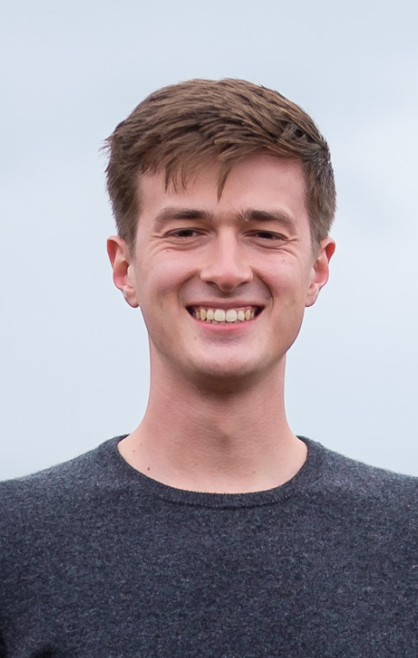
Luca Dahle graduated from secondary school in Berlin in 2014 and began studying for a Bachelor’s degree in mechanical engineering at ETH Zurich in the same year. He became involved in ETH’s Academic Mechanical and Electrical Engineering Association, and went on to join the committee in 2016, before being elected president in 2019. He gained his Bachelor’s degree the same year, and is now studying for a Master’s degree in micro and nanosystems. He has been president of VSETH since September 2020.
Honorary doctorates at ETH Zurich
In awarding honorary doctorates, ETH Zurich recognises individuals for their outstanding academic work and their significant achievements in science, teaching and practice, or in the synthesis of research and practical work.
The following have been appointed honorary doctorates of ETH Zurich in 2020

Professor Stephen R. Quake
for his pioneering work in microfluidics, and his groundbreaking technological innovations and entrepreneurial spirit at the interface between biology, biotechnology, medicine and physics.
Stephen Quake is an exceptional scientist and entrepreneur, whose research spans a wide range of disciplines from physics through to biology and medicine. Following his studies in mathematics and physics at Stanford and a doctorate in theoretical physics from Oxford (1994), Quake initially became known for the measurement of the biophysical phenomena of individual molecules. As a professor at Caltech (1996-2005) and later at Stanford (since 2004), he became a pioneer in microfluidics, revolutionising biomedical research and diagnostics. Quake has always focused on making the technology developed in his laboratory available to the broader biological and medical community by means of commercialisation.


Professor Frans A. Spaepen
for his outstanding contribution to the basic understanding of the structure and properties of melts and amorphous materials, and his significant impact on materials science and applied physics.
Following his studies at KU Leuven, Frans Spaepen obtained his doctorate in applied physics at Harvard University in 1975. He became an assistant professor there two years later and was appointed professor in 1983. As an outstanding researcher in materials science, he is a shining example of how a brilliant and creative personality can have a significant impact on a scientific community. He has opened up several fields of research and answered fundamental questions through his pioneering work. This includes the exemplary description of the mechanical properties of amorphous metals, the development of a fundamental understanding of material interfaces and the use of colloids in order to devise models for crystallisation. In addition to work on nanoscale materials and thin metal films, he has also made a significant contribution to the understanding of quasicrystals.

Honorary councillors of ETH Zurich
The title of Honorary Councillor is awarded to individuals who foster key scientific activities or fields of work at ETH, or who support the university as a whole.
The following have been appointed honorary councillors of ETH Zurich in 2020
Calvin F. Grieder
for his extraordinary personal commitment to the promotion of teaching and research at ETH Zurich, in particular for his outstanding ability to combine technical and entrepreneurial knowledge in order to realise innovative, visionary ideas.
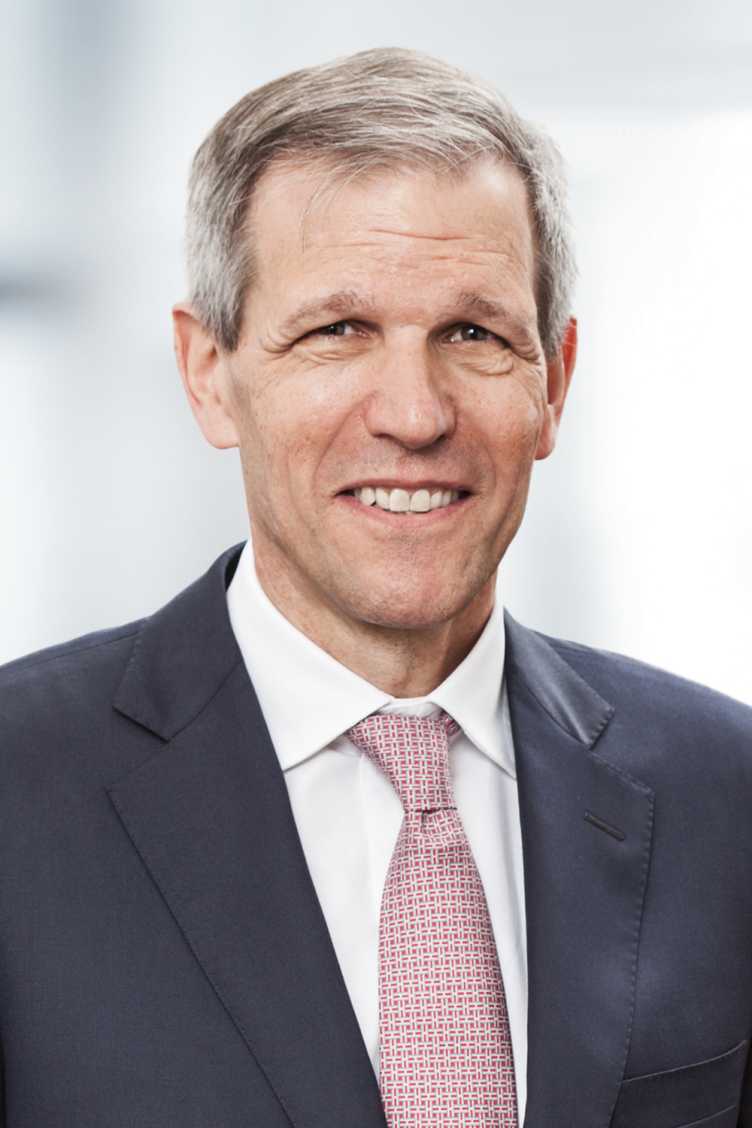
Calvin Grieder was born in 1955 and laid the foundation for his entrepreneurial success with his graduation from ETH in mechanical and process engineering in 1979. He has held leadership roles at notable companies, including CEO of the Bühler Group, and is now Chairman of both the Bühler Group and Givaudan SA. He is also a member of several boards of directors and shares his knowledge on various advisory boards, including at Avenir Suisse and Swissmem. As a member of the Industrial Advisory Board of the Department of Mechanical and Process Engineering, as an enthusiastic bridge-builder between business and science and not least as a significant supporter, Grieder is strongly committed to both ETH Zurich and the ETH Foundation.
Adrian U. Weiss
for his outstanding personal commitment to the promotion of teaching and research at ETH Zurich, in particular for his work in the areas of architecture, electrical engineering and computer science, as well as in student talent and entrepreneurial spirit.
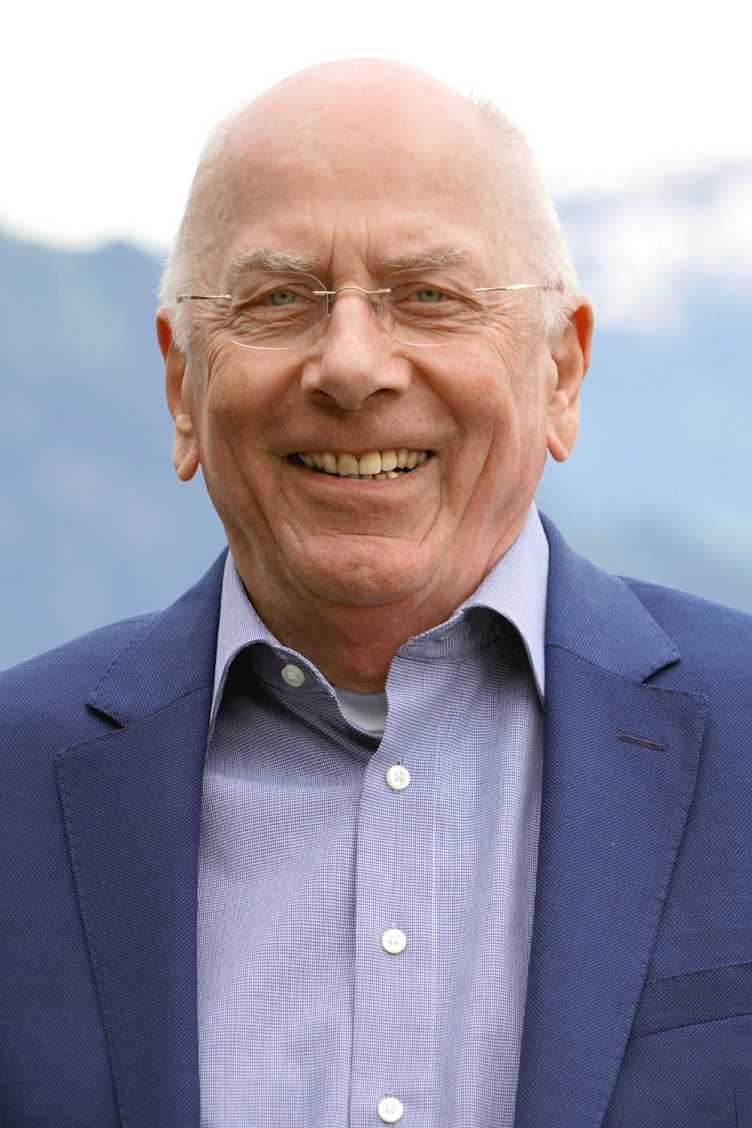
Adrian Weiss was born in 1940 and graduated from ETH Zurich in architecture in 1967. Following an eight-year period as an architect, he joined his father’s Magnetic Elektromotoren group. Weiss has held various positions as member and chairman of the board, and since 2014 has been president of the Adrian Weiss Stiftung, which he established. Through his foundation and the ETH Foundation, he is personally and financially committed to research and teaching at ETH, particularly in the fields of architecture, electrical engineering and computer science. Weiss is also concerned with the promotion of student talent and entrepreneurial spirit.
Industry and foundation prizes
ABB Research Prize
The prize awarded by ABB Switzerland rewards outstanding work in the fields of energy technology and information and automation technology, on a rotating basis. The prize in 2020 is awarded to two young people in energy technology:
Dr Tim Tröndle
for his doctoral thesis entitled “Renewable electricity for all: untangling conflicts about where to build Europe’s future supply infrastructure”.
Dr Guido Zichittella
for his doctoral thesis entitled “Alkane Activation by Catalytic Oxyhalogenation”.
Heinrich Hatt-Bucher Prizes
The Heinrich-Hatt-Bucher Prizes reward the three best Master's theses in the Department of Architecture and the Department of Civil, Environmental and Geomatic Engineering, on a rotating basis. The prizes in 2020 go to the Department of Civil, Environmental and Geomatic Engineering. They are awarded to:
1st prize: Letizia Meta Caderas
for her Master’s thesis entitled “A Theoretical Study on the Origin and Mitigation Strategies of Shrinkage in Earth-Based Construction Materials”.
2nd prize: Julian Hofmann
for his Master’s thesis entitled “Langzeitverhalten von Laubholzdeckensystemen”.
3rd prize: Patrick Andrew Studer
for his Master’s thesis entitled “Structural performance of ribbed concrete elements using flexible formworks with integrated reinforcement”.
Hilti Prize for Innovative Research
The Hilti AG prize rewards work that combines scientific content with a practice-based orientation in an outstanding manner. The prize in 2020 is awarded to:
Dr Seraina Anne Dual
for her doctoral thesis entitled “Measurement Principles for a real-time Cardiac Volume Sensor”.
IBM Research Prize
The IBM Research Prize rewards work by students in computational chemistry, biology and materials science. The prize in 2020 is awarded to:
Dr Jonny Proppe
for his doctoral thesis entitled “Computational Systems Chemistry with Rigorous Uncertainty Quantification”.
Otto-Jaag Water Protection Prize
This prize rewards work in the field of water protection and hydrology. The prize in 2020 is awarded to:
Dr Matthew Tobias Moy de Vitry
for his doctoral thesis entitled “Public Surveillance and the Future of Urban Pluvial Flood Modelling”.
Latsis Prize
Since 1985, the ETH Zurich Latsis Prize awarded by the Fondation Latsis Internationale has honoured younger researchers working in all areas at ETH Zurich, up to and including the level of assistant professor. The focus is on their outstanding independent academic work at ETH. The prize in 2020 is awarded to:
Professor Lavinia Heisenberg
for outstanding achievements in the field of theoretical physics, in particular for her systematic consideration of the possible generalisations of the general theory of relativity through the integration of vector and tensor fields in geometry.
Read the portrait of Lavinia Heisenberg
Lopez-Loreta Prize
The prize awarded by the Fondation Jean-Jacques et Felicia Lopez-Loreta honours outstanding ETH graduates and enables them to realise research or innovation projects. The prize in 2020 has been awarded to:
Dr Jochen Mueller
for his project entitled “Next-Generation Prosthetics: Towards the end of disability via digital fabrication”.
ETH Rector Sarah Springman presents the industry and foundation awards.
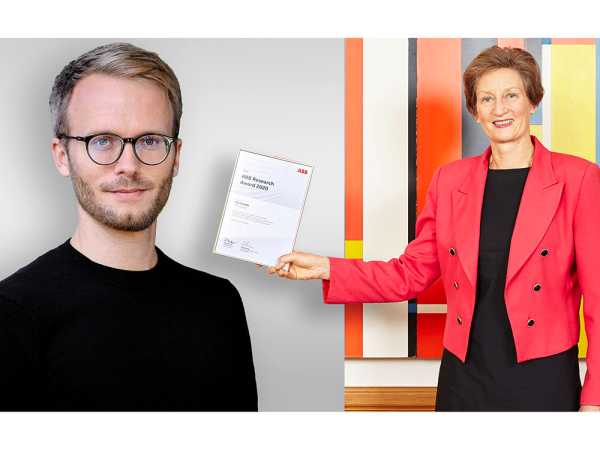
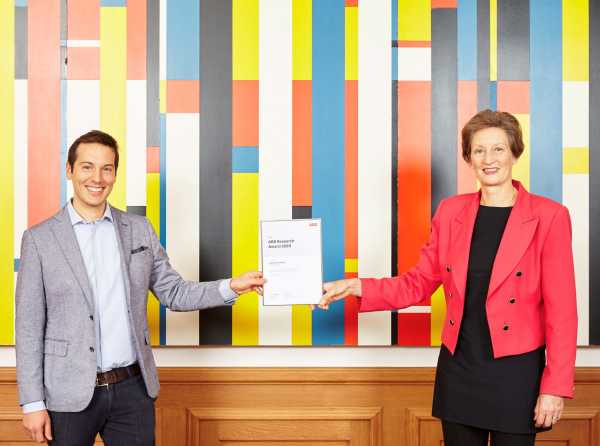
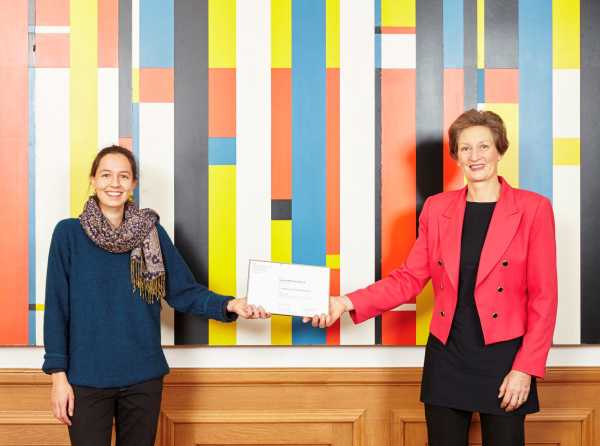
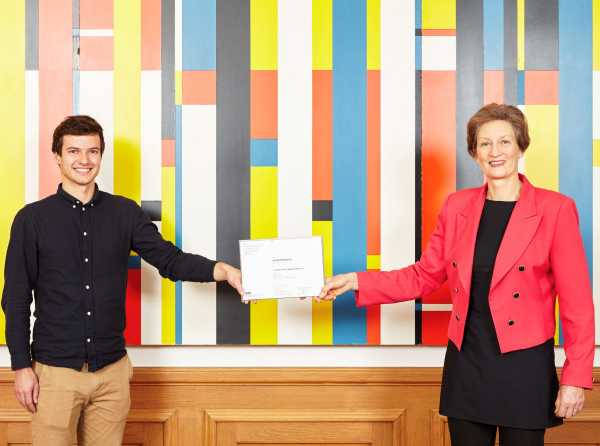
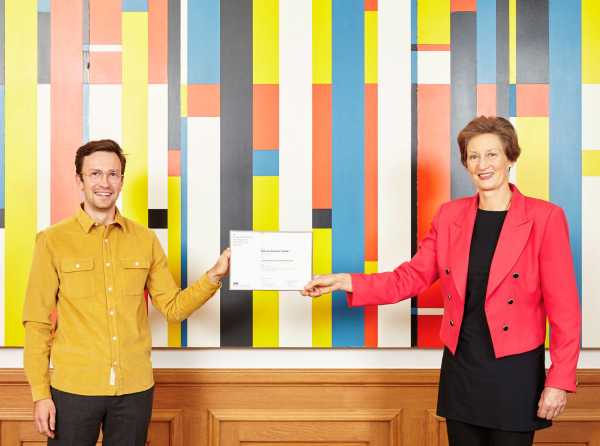
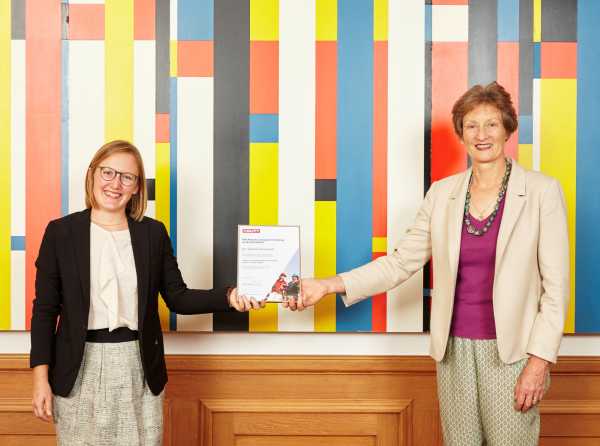
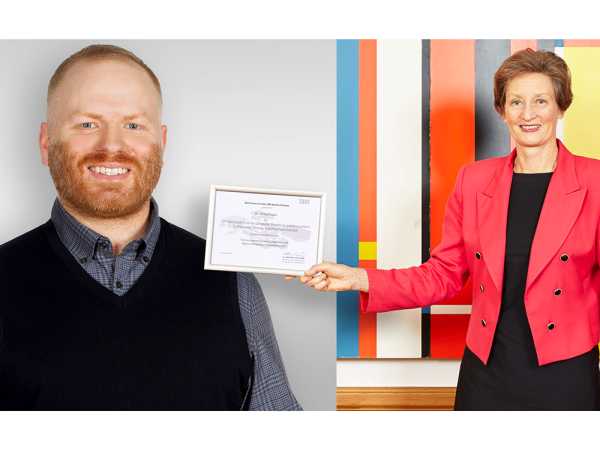
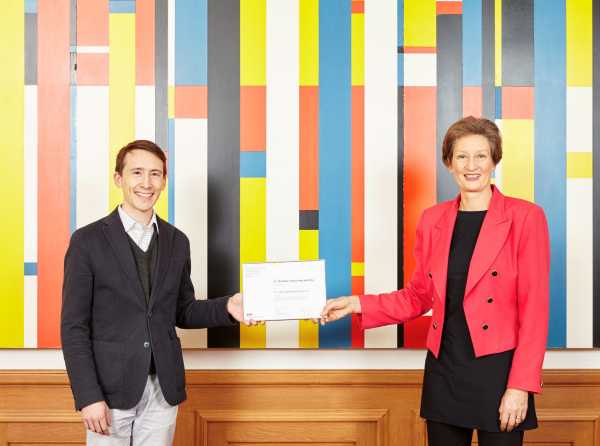
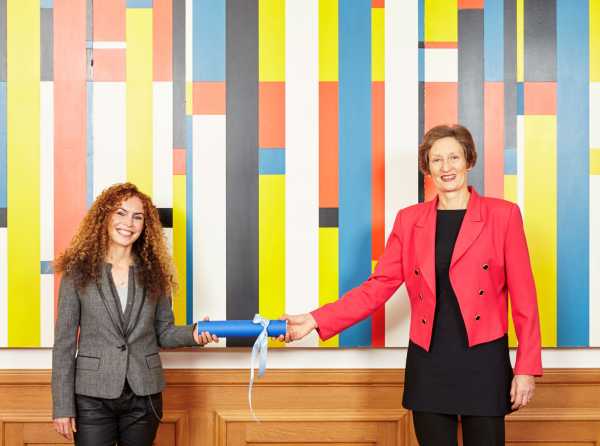
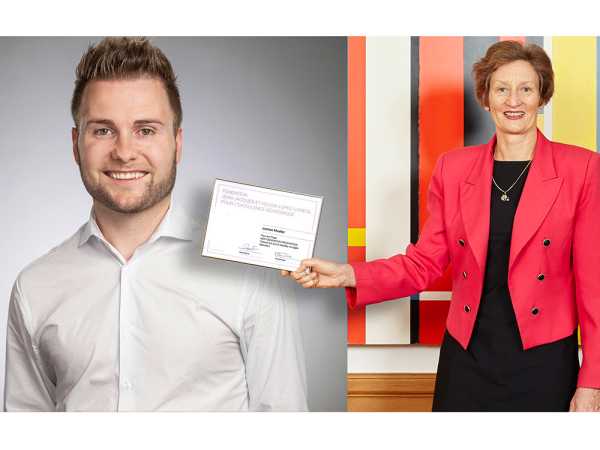
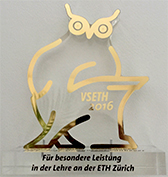
The Association of Students at ETH Zurich (VSETH) represents the interests of the students to the Executive Board and authorities. At ETH Day, its president Luca Dahle presented particularly dedicated lecturers with the Golden Owl in recognition of their excellent teaching. One lecturer per department receives this student-awarded prize.
Students are able to evaluate all the lecturers whose lectures they attend. Title, origin, training and quality of research are not relevant here – only the quality and commitment of lecturers in terms of their teaching. The prize winners are selected by the subject associations on the basis of these evaluations, taking into account the teaching materials used, their commitment outside the course and the quality of student supervision.

Credit Suisse Award for Best Teaching
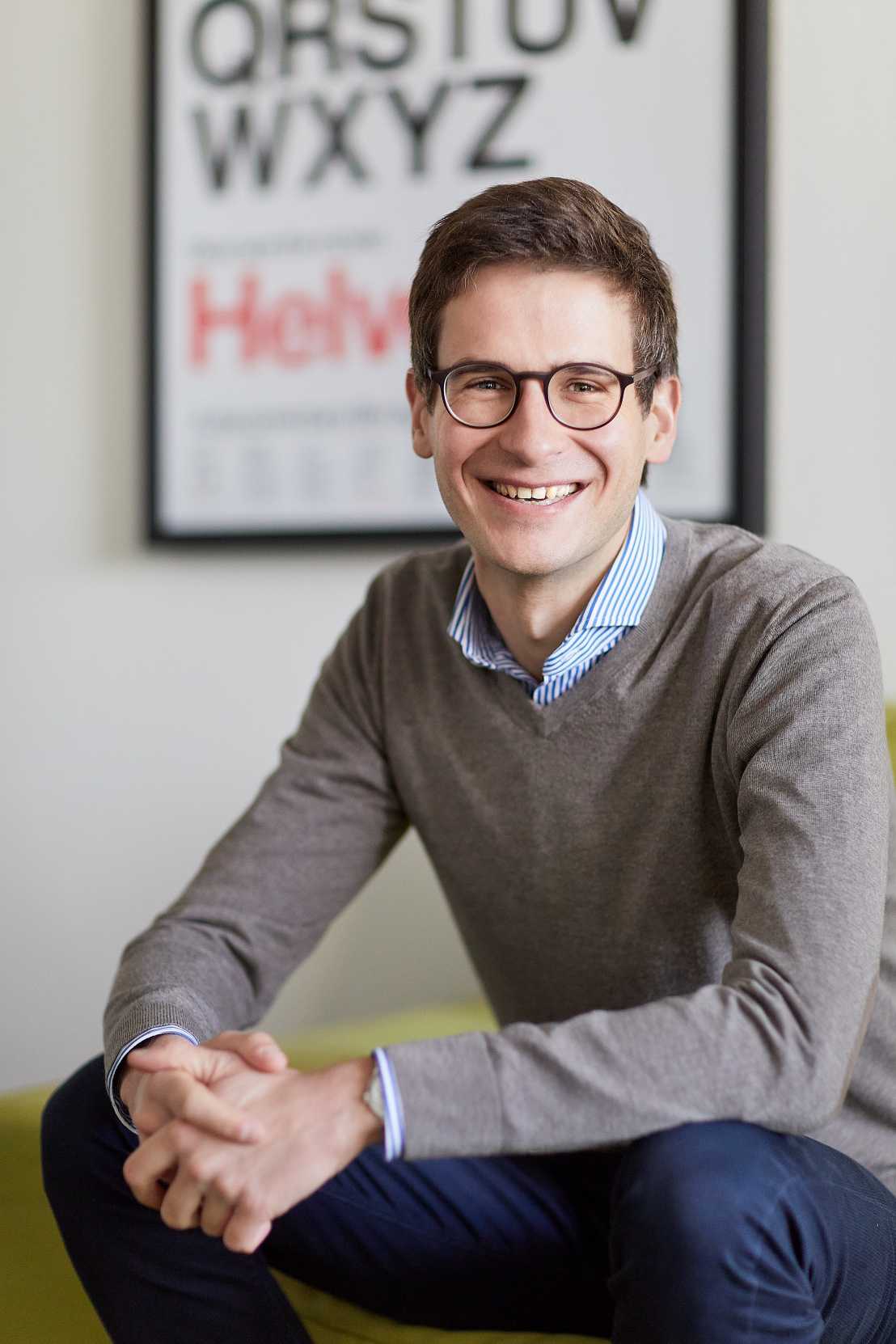
The Credit Suisse Award for Best Teaching was launched by the Credit Suisse Foundation in 2006 in collaboration with the universities, universities of technology and universities of applied science to enable Swiss universities to honour their best teachers on an annual basis. At ETH Zurich, the student survey for the Golden Owl award serves as a basis for nominating candidates for the Credit Suisse Award for Best Teaching. On the basis of the overall ranking list and additional criteria, VSETH and the subject associations work together to determine the winners of the award.
The Credit Suisse Award for Best Teaching 2020 goes to: Professor Laurent Vanbever from the Department of Information Technology and Electrical Engineering.
Presentations by young researchers
At ETH Day 2020, three young researchers from the fields of human medicine, interdisciplinary sciences and product development will offer you an insight into their valuable project work during the pandemic – helpfulETH and external page Studens4Hospitals.
Speakers
Rahel Schmidt
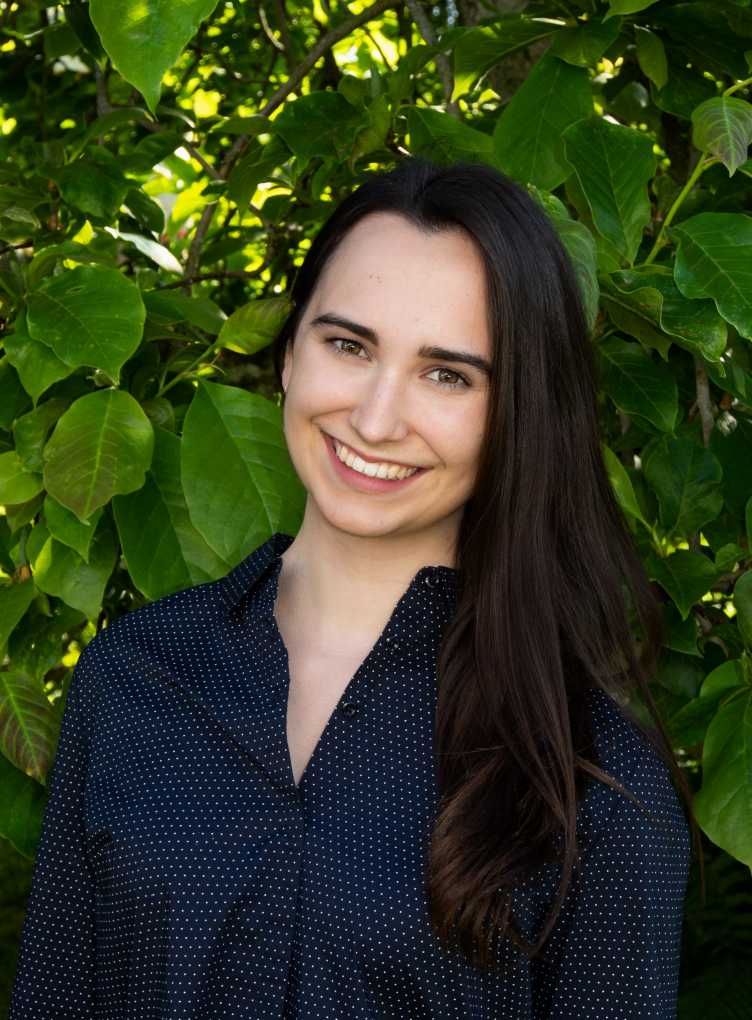
Rahel completed her Bachelor’s degree in human medicine at ETH in August 2020. On 12 March, the day on which ETH announced the switch to online teaching, she was called up for a two-month assignment at Kantonsspital Baden. This hospital experience made her certain that everything possible needed to be done in order to ease the capacity bottlenecks in healthcare. Together with her partner Luca Schaufelberger, she decided to launch the initiative “Students4Hospitals”. Rahel is currently studying for the new Master’s course in human medicine at the Università della Svizzera Italiana with a scholarship from the Binding Foundation, and is organising events on the subject of vaccination.
Luca Schaufelberger
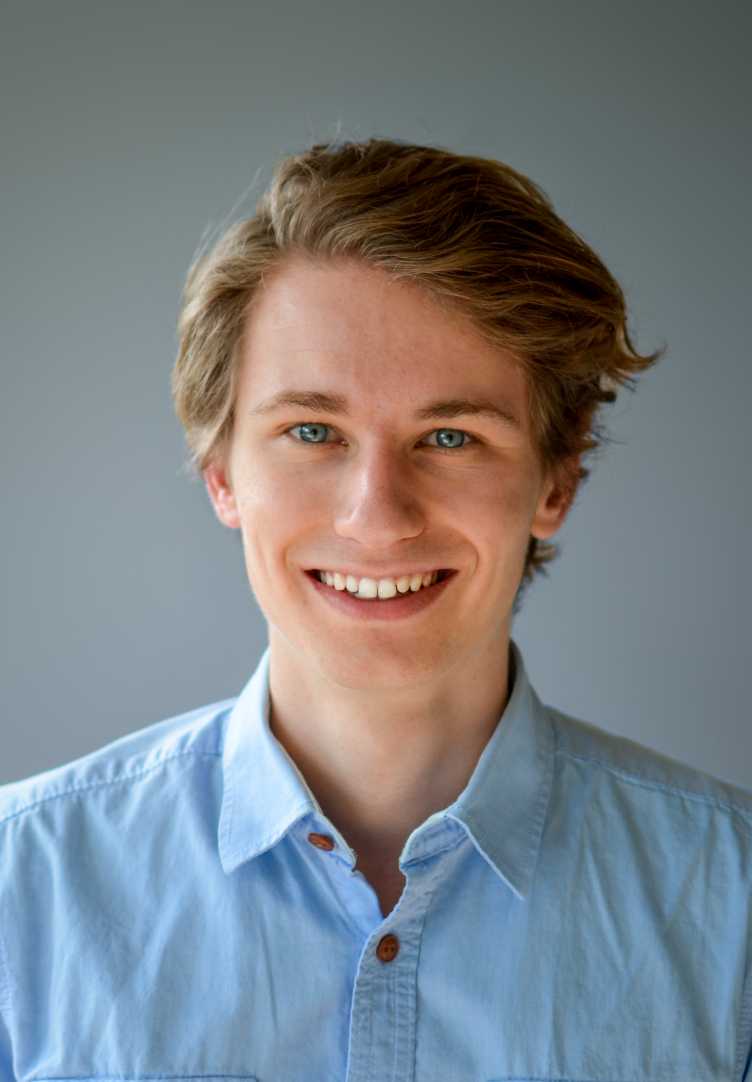
Luca is a Fellow of the Werner Siemens Foundation and is in his third year of a Bachelor’s degree in interdisciplinary sciences, with a focus on the physicochemical. In addition to his studies, he is also involved in scientific communication, organising the nanoTalks lecture series and running workshops on the subject of scientific storytelling. Even before the exceptional situation was announced in March, he and Rahel Schmidt launched the “Students4Hospitals” initiative to enable hospitals and care homes that needed short-term personnel support to call for assistance. The “Students4Hospitals” team went on to recruit students from all disciplines and coordinate their deployment in tasks including access control and monitoring of visitor areas.
Séline Steffanoni
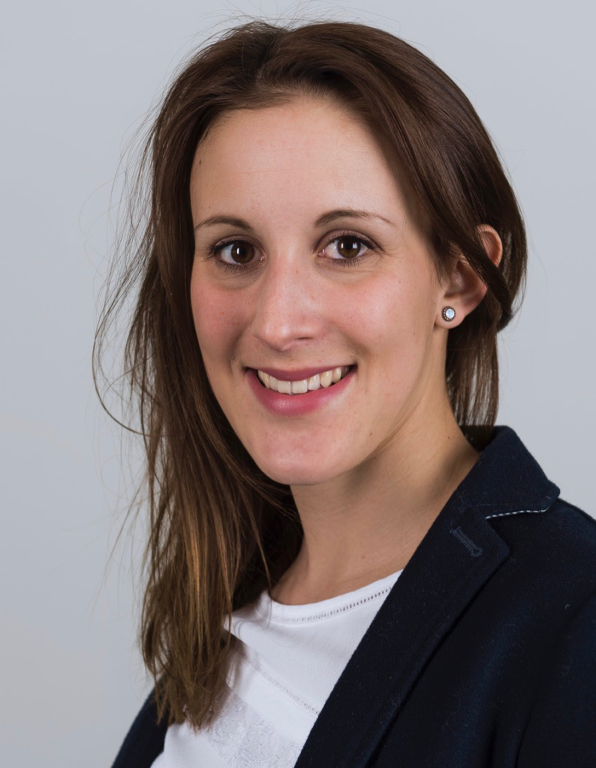
Séline studied at ETH Zurich and completed her Master’s degree at D-HEST with a focus on health technology in 2017. She has been a doctoral student in Professor Mirko Meboldt's Biomedical Systems group since this summer. Her aim is to generate clinical value and make a contribution to patient wellbeing through the development of innovative systems. During lockdown, she provided valuable support to the helpfulETH initiative in addition to carrying out her own research. HelpfulETH forms part of the national Covid-19 Science Taskforce and aims to help eliminate as quickly as possible the barriers caused by COVID-19 faced on a daily basis by clinical personnel, with the aid of interdisciplinary teams and agile development.
Contact
ETH Zurich
Corporate Communications
Rämistrasse 101
8092 Zurich
Switzerland